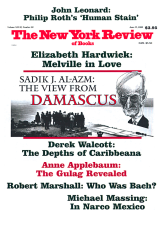“We are not here to fight anybody,” the commander of the British paratroops in Freetown told the BBC on May 11, “but if we are attacked we shall give a very robust response.” His forces had secured the airport, evacuated foreign nationals, and were steadily moving into the city. On the night of May 11 they loudly fired their weapons in what was described as an exercise. “Just training,” their spokesman said, but they could be heard all over Freetown.
Unfortunately most of the other foreign troops sent to Sierra Leone were far less effective. If an outside force is to intervene successfully in the violent chaos of a country like Sierra Leone, its troops must be a coherent group and arrive quickly. They must be well led and solidly motivated. They must have a clear plan and rules of engagement. They must be highly trained, and equipped with the best weapons and communications. They must not only look tough but be tough. They must show at all times that they know exactly what they are doing. Then they can afford to be nonaggressive.
The United Nations, the eternal fig leaf of the world’s powers, was put into Sierra Leone to guarantee a slapdash peace agreement that turned out not to exist except on paper. It was particularly irresponsible of Western powers to insist last year on the inclusion in the new government of Foday Sankoh, a rebel leader who is notoriously brutal and corrupt. The UN peacekeeping force became embroiled in an vicious civil war for which it had no mandate and had no preparation whatsoever. It quickly suffered casualties, and some five hundred of its soldiers were taken hostage. For over a week the force was generally in retreat. This is not surprising.
The UN operation in Sierra Leone was proceeding according to the old peacekeeping formula calling for nonforceful cooperation with consenting parties. The UN force had been arriving piecemeal over a period of months. Many of its soldiers were poorly equipped and totally unprepared for violent opposition. They were extremely unimpressive at exactly the moment when they most needed to give the impression of confidence and military superiority. They were anything but a coherent, integrated, and dominating force. One felt extremely sorry for them.
If the United Nations is now regularly to be injected into internal struggles in Africa and elsewhere—in order, some cynics say, to give the busy Western powers at least the appearance of doing something about humanitarian disasters—it must, at last, be provided with a reliable means of intervening speedily and effectively. If soldiers suitably prepared for such duties are not to be made available by major military powers, the UN must have a highly trained and universally respected rapid reaction force of its own, acting on the directives of the Security Council.
Such an arrangement would avoid the delays, restraints, humiliations, and shortcomings involved in trying at the last moment to get any soldiers at all from reluctant member governments. Carefully selected, trained, and led, such a rapid reaction group could be recruited from all parts of the world and could become a powerful element of international stability and order. It would be the spearhead of conventional peacekeeping forces in violent situations.
Of course it would cost money, but that would still be a small fraction of the material, and human, costs of disasters like those in Rwanda and Sierra Leone. It is sometimes said that a truly United Nations force would threaten the principle of national sovereignty. Why should it, if it is under the control of the Security Council? Surely the nations of the world are not frightened of UN peacekeeping becoming too effective and too efficient. If they want the organization to intervene in some of the worst human tragedies, but, quite understandably, do not want to be physically involved themselves, they must provide the United Nations with at least the minimum capacity to act effectively. They cannot have it both ways.
—May 17, 2000
This Issue
June 15, 2000



